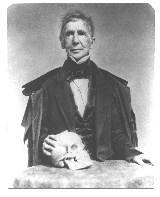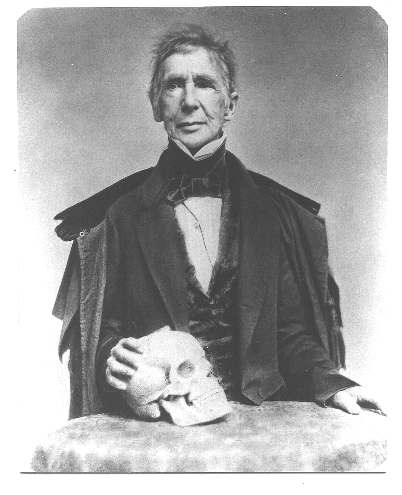
John Collins Warren
Encyclopedia

William T.G. Morton
William Thomas Green Morton was an American dentist who first publicly demonstrated the use of inhaled ether as a surgical anesthetic in 1846. The promotion of his questionable claim to have been the discoverer of anesthesia became an obsession for the rest of his life.- Life and work :Born in...
to provide ether anesthesia
Anesthesia
Anesthesia, or anaesthesia , traditionally meant the condition of having sensation blocked or temporarily taken away...
while Warren performed a minor surgical procedure. News of this first public demonstration of surgical anesthesia quickly circulated around the world.
Biography
Born in BostonBoston
Boston is the capital of and largest city in Massachusetts, and is one of the oldest cities in the United States. The largest city in New England, Boston is regarded as the unofficial "Capital of New England" for its economic and cultural impact on the entire New England region. The city proper had...
, he was the son of John Warren
John Warren (surgeon)
John Warren was a Continental Army surgeon during the American Revolutionary War, founder of the Harvard Medical School and the younger brother of Joseph Warren.-Early life:...
, well-known doctor, Harvard professor, and a founder of the Harvard Medical School
Harvard Medical School
Harvard Medical School is the graduate medical school of Harvard University. It is located in the Longwood Medical Area of the Mission Hill neighborhood of Boston, Massachusetts....
. {His uncle was Dr. Joseph Warren
Joseph Warren
Dr. Joseph Warren was an American doctor who played a leading role in American Patriot organizations in Boston in early days of the American Revolution, eventually serving as president of the revolutionary Massachusetts Provincial Congress...
}. He graduated from Harvard College
Harvard College
Harvard College, in Cambridge, Massachusetts, is one of two schools within Harvard University granting undergraduate degrees...
in 1797, then began the study of medicine with his father. In 1799, he continued his medical studies in London
London
London is the capital city of :England and the :United Kingdom, the largest metropolitan area in the United Kingdom, and the largest urban zone in the European Union by most measures. Located on the River Thames, London has been a major settlement for two millennia, its history going back to its...
and Paris
Paris
Paris is the capital and largest city in France, situated on the river Seine, in northern France, at the heart of the Île-de-France region...
, including work with the pioneer anatomist Sir Astley Cooper
Astley Cooper
Sir Astley Paston Cooper, 1st Baronet was an English surgeon and anatomist, who made historical contributions to otology, vascular surgery, the anatomy and pathology of the mammary glands and testicles, and the pathology and surgery of hernia.-Life:Cooper was born at Brooke Hall in Brooke, Norfolk...
(1768–1841). On his return to America in 1802, Warren entered into partnership with his father and also assisted him with anatomical lectures, dissections, and demonstrations at Harvard Medical School
Harvard Medical School
Harvard Medical School is the graduate medical school of Harvard University. It is located in the Longwood Medical Area of the Mission Hill neighborhood of Boston, Massachusetts....
.
He was named Adjunct Professor of Anatomy
Anatomy
Anatomy is a branch of biology and medicine that is the consideration of the structure of living things. It is a general term that includes human anatomy, animal anatomy , and plant anatomy...
and Surgery
Surgery
Surgery is an ancient medical specialty that uses operative manual and instrumental techniques on a patient to investigate and/or treat a pathological condition such as disease or injury, or to help improve bodily function or appearance.An act of performing surgery may be called a surgical...
in 1809, then, at his father's death in 1815, assumed the Hersey Professorship of Anatomy and Surgery, which post he held until retirement in 1847. During this time, Warren played a leading role in establishing New England's first medical journal, The New England Journal of Medicine and Surgery (first issue January 1812), which subsequently evolved into today's New England Journal of Medicine
New England Journal of Medicine
The New England Journal of Medicine is an English-language peer-reviewed medical journal published by the Massachusetts Medical Society. It describes itself as the oldest continuously published medical journal in the world.-History:...
. He was also active in the Anthology Club
Anthology Club
The Anthology Club, or Anthology Society was organized in 1804 in Boston, Massachusetts by the Rev. William Emerson, father of Ralph Waldo Emerson....
.
Warren was the first dean of Harvard Medical School
Harvard Medical School
Harvard Medical School is the graduate medical school of Harvard University. It is located in the Longwood Medical Area of the Mission Hill neighborhood of Boston, Massachusetts....
(1816–1819) and promoted its move from Cambridge
Cambridge, Massachusetts
Cambridge is a city in Middlesex County, Massachusetts, United States, in the Greater Boston area. It was named in honor of the University of Cambridge in England, an important center of the Puritan theology embraced by the town's founders. Cambridge is home to two of the world's most prominent...
to Boston. Although he never received an earned medical degree, Harvard presented him with an honorary medical degree in 1819. He was a founding member of Massachusetts General Hospital
Massachusetts General Hospital
Massachusetts General Hospital is a teaching hospital and biomedical research facility in the West End neighborhood of Boston, Massachusetts...
and served as the facility's first surgeon. He held an appointment on the hospital staff until 1853 and was then on its Board of Consultation until his death. Over the course of his long career, Warren assembled an extraordinary teaching collection of anatomical and pathological specimens, which he presented to Harvard in 1847 along with $5000. This was the beginning of the Warren Anatomical Museum
Warren Anatomical Museum
The Warren Anatomical Museum, housed within Harvard Medical School's Countway Library of Medicine,was founded in 1847 by Harvard professor Dr. John Collins Warren,...
.
Warren and anesthesia
.jpg)
Horace Wells
Horace Wells was an American dentist who pioneered the use of anaesthesia in dentistry, specifically nitrous oxide .-Life:...
on January 20, 1845. Although Warren did not believe that the anesthesia would work, he arranged for a demonstration at Massachusetts General Hospital. Warren presented Wells to his students but the patient who had been scheduled that morning, for an amputation, refused to be operated. Warren then asked his students if anybody needed a tooth extracted and one student agreed. Unfortunately the gas was not properly administered. The student suffered normal levels of pain, thus discrediting Wells and nitrous oxide as an anesthetic.
Notwithstanding that failure, on October 16, 1846, Warren again agreed to perform a public demonstration of a surgical operation on a patient, this time under ether anesthesia administered by Wells' colleague and competitor, William Thomas Green Morton
William T.G. Morton
William Thomas Green Morton was an American dentist who first publicly demonstrated the use of inhaled ether as a surgical anesthetic in 1846. The promotion of his questionable claim to have been the discoverer of anesthesia became an obsession for the rest of his life.- Life and work :Born in...
. Warren was at this time 68 years of age. The operation lasted about ten minutes and the patient was seemingly unconscious for its duration. After Warren had finished, and the patient had regained consciousness, Warren asked the patient how he felt. Reportedly, the patient answered: "Feels as if my neck's been scratched". Warren then stated to his audience "Gentlemen, this is no Humbug". His personal journal for this day records, "Did an interesting operation at the Hospital this morning, while the patient was under the influence of Dr. Morton's preparation to prevent pain. The substance employed was sulphuric ether." Warren was quick to see the remarkable advantages offered by ether in surgical procedures, and he then championed the cause of etherization through his work and publications.
Mindful of the potential importance of the demonstration, Warren had invited noted photographer Josiah Johnson Hawes
Josiah Johnson Hawes
Josiah Johnson Hawes was a photographer in Boston, Massachusetts. He and Albert Southworth established the photography studio of Southworth & Hawes, which produced numerous portraits of exceptional quality in the 1840s-1860s.-Biography:...
, of Southworth & Hawes
Southworth & Hawes
Southworth & Hawes was an early photographic firm in Boston, 1843-1863. Its partners, Albert Sands Southworth and Josiah Johnson Hawes , have been hailed as the first great American masters of photography, whose work elevated photographic portraits to the level of fine art...
, to document the surgery. However Hawes was squeamish at the sight of blood, and thus he made a daguerrotype of the surgery's re-enactment instead. In subsequent months he was to make a series of daguerrotypes of actual operations. Later Warren presented his Laundy scalpel
Scalpel
A scalpel, or lancet, is a small and extremely sharp bladed instrument used for surgery, anatomical dissection, and various arts and crafts . Scalpels may be single-use disposable or re-usable. Re-usable scalpels can have attached, resharpenable blades or, more commonly, non-attached, replaceable...
and probe, the surgical instruments he used in the operation, to Hawes in gratitude for recording some of the earliest anesthesia operations.
Selected works
- Description of an Egyptian mummy, presented to the Massachusetts General Hospital: with an account of the operation of embalming in ancient and modern times. Date uncertain.
- A comparative view of the sensorial and nervous systems in men and animals. Boston, J. W. Ingraham, 1822.
- The preservation of health. With remarks on constipation, old age, use of alcohol in the preparation of medicines. Boston, Ticknor, Reed and Fields, 1854.
- Remarks on some fossil impressions in the sandstone rocks of Connecticut River. Boston, Ticknor and Fields, 1854.
- The Mastodon giganteus of North America. 2d ed., with additions. Boston, Wilson, 1855.

